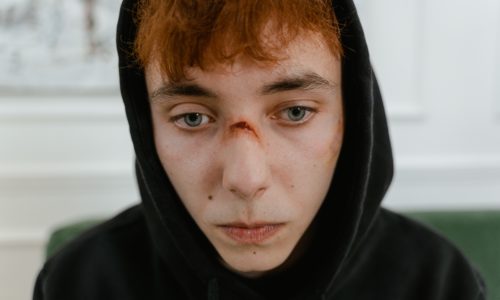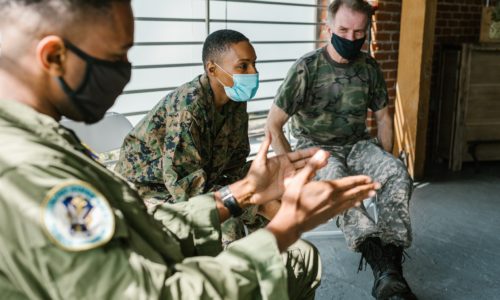Articles about Anxiety from Lori Calabrese, M.D. | The Ketamine Blog
When you feel that sense of dread or uneasiness about something in the present or in the future, that’s anxiety. Everybody feels that way at some point. An interview for a job, meeting your fiancee’s family, a major exam…. But for some people, the unpleasant dread can be overly intense and ongoing. When it’s so intense that it interferes with your life, causing you to miss work, or miss social opportunities… then it may be a disorder. These articles about anxiety shed light on the difference between moments of anxiety, and a lifetime with a severe, debilitating disorder.
Anxiety can be as mild as a transient feeling of butterflies, or so intense and overpowering you think you’re having a heart attack so you call 911.
Types of anxiety disorders:
1. Social anxiety
is the overpowering and relentless fear of being watched and judged by others. It can cause you to feel afraid to meet new people, to believe everyone in the room is talking about you, and to feel intensely self conscious in the presence of others. This is a serious mental health condition that can prevent you from interviewing for jobs or excelling at the one you have, or from meeting new people and building relationships.
2. Postpartum anxiety
This is emerging as a serious disorder in woman, at least as prevalent as postpartum depression. It can express symptoms like panic, fear of harming the baby, poor bonding with baby, obsessive worrying, inability to eat, sleep, or relax. Also, it can include the obsessive fear the panic will never resolve.
3. General anxiety disorder
obsessive and continuous worry about one’s health, work, social contacts and interactions, as well as daily routine circumstances and experiences…that repeat almost every day for at least six months.
4. Panic Disorder
Characterized by repeated and overwhelming panic attacks with accelerated pounding heart rate, sweating, trembling, shortness of breath, and feelings of impending doom. Often brought on by triggers, but not always. The attacks lead to a fear of the attacks, and a driving desire to avoid them, which can often lead to agoraphobia.
5. Test anxiety
Irrational dread of testing in spite of being well prepared. The anxiety can rise until the person’s displaying symptoms of panic like accelerated heart rate, headache, nausea and sweating. Can result in the mind going blank, and general functioning shuts down.
6. Phobia-related disorder
Agoraphobia – fear of enclosed public spaces, fear of open spaces
Arachnophobia – fear of spiders
Acrophobia – fear of heights
Dentophobia – fear of dentists
Claustrophobia – fear of enclosed, confined spaces
Aerophobia – fear of flying
Aquaphobia – fear of water
Zoophobia – fear of animals
Coulrophobia – fear of clowns – (not officially recognized but widely claimed)
7. Separation anxiety
Occurs in children and adults, and expresses as fear of being apart from people to whom they’re attached. They often worry that something terrible will happen to the person they’re connected to, and so avoid separation from that person as well as avoid being alone.
8. Selective mutism
A rare disorder in both children and adults where people don’t speak in specific situations, even though they have well developed language skills. It’s often associated with extreme shyness and fear of social embarrassment, and usually begins before the age of five.
9. Obsessive -Compulsive Disorder (OCD)
Considered to be connected to anxiety disorders, but there is controversy as to whether it belongs here. At the very least, that person who suffers from OCD has feelings of anxiety and usually feels powerless to control the intrusive thoughts they have, or their reaction to them.
This is not an exhaustive list, but rather examples of anxiety disorders.
Treatment of Anxiety Disorders
Some people suffer from a cluster of anxiety disorders and mood disorders combined, while some struggle with only one. Since anxiety disorders are best treated for the specific diagnosis, the more complex a person’s condition is, the more complex it may be to treat.
Transcranial Magnetic Stimulation (TMS)
demonstrates promising outcomes for some types of anxiety. Cognitive behavioral therapy shows the most promising outcomes as a form of psychotherapy. Psychotherapy combined with anxiolytic medicines, serotonin reuptake inhibitors (SRIs) and serotonin norepinephrine reuptake inhibitors (SNRIs) can be helpful, as well.
IV ketamine treatment has demonstrated favorable outcomes in some patients with some types of anxiety. Social anxiety can be debilitating and interfere with the desire to build life, family, and career. Ketamine treatment is one of the most effective treatments for social anxiety. There is exciting work being done with OCD patients and ketamine treatment also.
We invite you to continue reading the following articles about anxiety by Lori Calabrese, M.D.

It’s that time of year again. The holidays and parties and celebrations are behind. We’re left to clean up the mess, pay the bills for what we spent…. And try to avoid falling into depression. That’s right. January is often considered the most depressing month of the year. And actually there’s a reason for that. […]
Continue Reading

Your answer to that question could quite possibly be a hint to your mental health going forward. Why? Generally, because the more early indicators we can identify and treat, the better the outcomes we see by catching symptoms early… before they turn into real problems. In fact, the more indicators we can identify, the more […]
Continue Reading

Anxiety is a part of all our lives. Feeling nervous before a test, or before a meeting with the boss. But for some, anxiety continues to get worse until it is a disorder…and needs an intervention because it’s interfering in your life. How can you know the difference? For example, a time of life when […]
Continue Reading

There are so many sides to this controversy. Marijuana’s good for what ails you – right? For cancer pain, anxiety, depression…for putting your body back in order… Or is it?? There has long been a belief that cannabis, another name for marijuana, was associated with suicidality. Not a popular belief, but one supported by neuroscience. […]
Continue Reading

Know any men who can flip from mild annoyance to a violent rage in a short minute? Know any women who are wounded and intimidated by a man’s anger? Now if that anger is violent then it’s likely lots of women and children as well are wounded and intimidated by it. Let’s talk about the […]
Continue Reading

We’ve been talking lately about how neuroscience researchers explore for possibilities for better medicines. Lately, there’s been more work exploring fear and memories of fearful experiences, and how to erase those memories…or at least make the memories weaker. Those memories play a big role in anxiety, PTSD, and bipolar disorder. We talked about AKT. Now, a […]
Continue Reading

When you think about going to a gathering, walking into a room full of people, how do you feel? Tense…nervous…? People are getting vaccinated. It’s highly likely, if you’ve had both vaccine injections, that you may be invited to an July 4th gathering of friends and family who’ve also been vaccinated. Can you imagine? How […]
Continue Reading

You may hear people say, “Antidepressants and other psych meds just don’t do anything…” Some people say, “…placebos work better…” Oh please. But why do they say that? Maybe their own experience with prescribed medicines was disappointing. So — of course — they’re disillusioned about these medicines. We get it. And we know that any given […]
Continue Reading

What makes it so hard? Devon tuned into his department meeting. Another Zoom meeting. He was so tired of online meetings…the technical lapses, interruptions… you can read people so much easier face to face. At the same time, he could sit in an easy chair for the meetings, so that wasn’t so bad. But no […]
Continue Reading

Sam wasn’t sleeping enough. As in, not much at all. She just couldn’t drop off. But even if she did she’d wake right back up. Day after day, week after week. She’s done everything she knows to do. And she has to work, so she just has to get by. Still, it scares her because […]
Continue Reading









